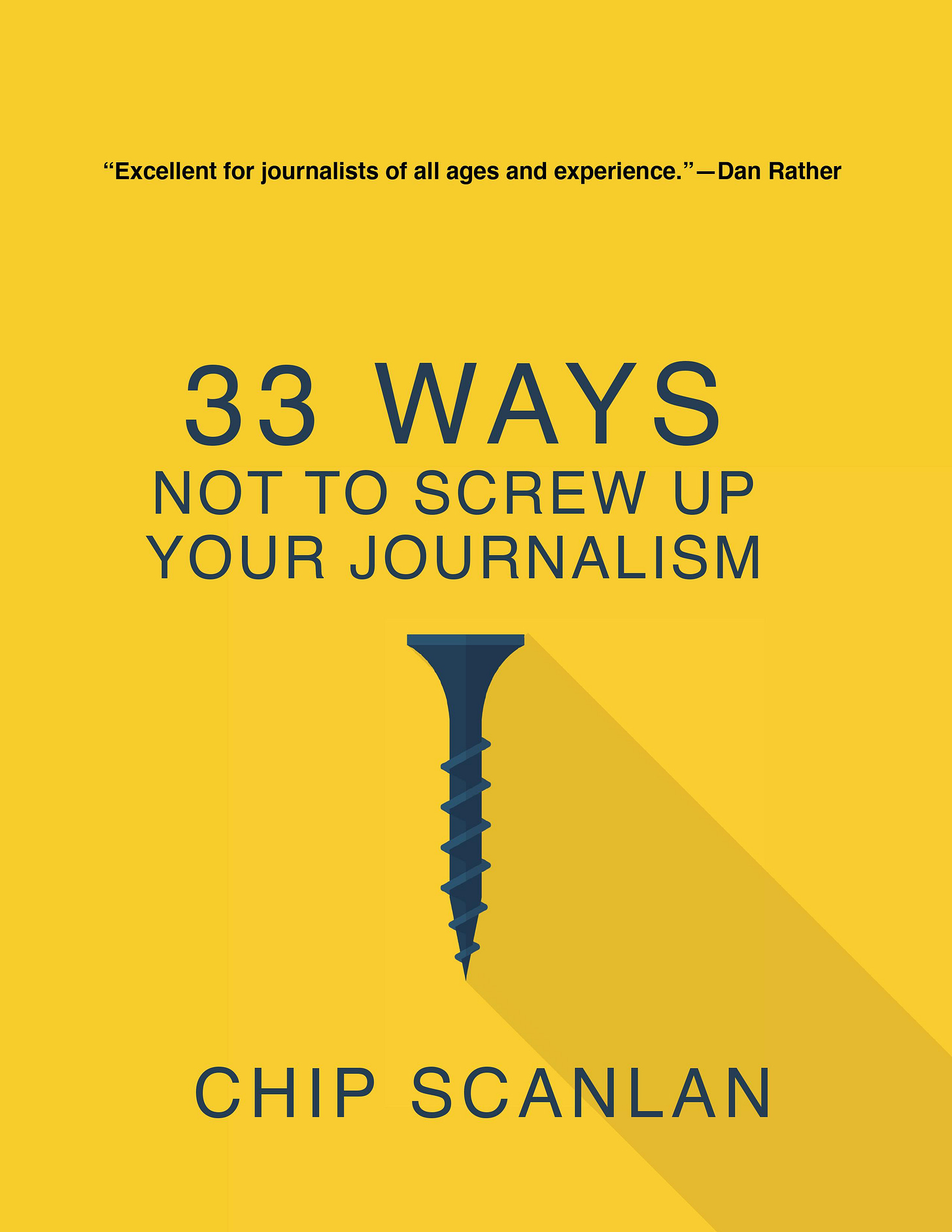Chip's Writing Lessons #88
Newsletter
In this issue
Writers Speak | Salman Rushdie on writer’s block
Interview | 4 Questions with Lizzie Johnson
Craft Lesson | Listening to your voice: A survey
Writing to savor | “Seven stowaways and a hijacked oil tanker: The strange case of the Nave Andromeda” by Samira Shackle, the Guardian, June 9, 2022
Tip of the week | Heed the one-breath rule
WRITERS SPEAK | SALMAN RUSHDIE ON WRITER’S BLOCK
“I’ve simply never allowed myself to use the phrase ‘writer’s block.’ Everybody has a moment when there’s nothing in your head. And you think, Oh, well, there’s never going to be anything. One of the things about being seventy-five and having written twenty-one books is that you know that, if you keep at it, something will come.” —Salman Rushdie
Bill O’Leary/Washington Post
INTERVIEW | 4 QUESTIONS WITH LIZZIE JOHNSON
Lizzie Johnson is a reporter on the Washington Post’s local enterprise team and the author of Paradise: One Town’s Struggle to Survive an American Wildfire. Previously, she was a staff writer at the San Francisco Chronicle. She has also worked at the Dallas Morning News, the Chicago Tribune, the Omaha World-Herald and El Sol de San Telmo in Buenos Aires. She has B.A. degrees in journalism and political science from the University of Missouri at Columbia. Johnson is a three-time finalist for the Livingston Award for Young Journalists. The California News Publishers Association has recognized her for Best Writing, Best Profile, Best Enterprise and Best Feature. In 2021, she won first place for long-form feature writing in the Best of the West contest. She has appeared on “Longform Podcast,” “This American Life,” “Longreads Podcast” and “Climate One from the Commonwealth Club.” Her work has been featured by the Columbia Journalism Review, the Dart Center for Journalism and Trauma and Harvard University’s Nieman Storyboard. Johnson, who was raised in the Midwest, and her dog, Indie, currently call D.C. home.
What is the most important lesson you’ve learned as a writer?
So much of writing happens when you aren’t actually writing. I come up with my best ledes and kickers when I let myself take a break and do something else, like go for a run or weed my garden. Switching gears when I’m stuck jumpstarts my creativity. I’ll rush right back to my keyboard with a renewed sense of purpose. (Which is probably why I’ve gotten dirt jammed in the keys so many times.)
What has been the biggest surprise of your writing life?
The writing cannot stand without the reporting. It might seem like shaping the story is the longest part of the process, but I’ve found that it’s easiest if you invest in the information gathering — no matter how long it takes. Digging through archives, putting in public records requests, gathering documentation, like copies of text messages, emails, phone logs, staying with a story subject an hour longer than you anticipated. Writing scenes is much easier when you have plenty of information to choose from — and it’s impossible when you don’t have the reporting to hold the storytelling up.
If you had to use a metaphor to describe yourself as a writer, what would it be?
A mechanic. If the engine’s not running, it doesn’t matter how many bells and whistles the story has. As a writer, I’m constantly tinkering, trying to figure out what works, structure and tension-wise, knowing that, otherwise, people won’t read until the end.
What is the best writing advice anyone ever gave you?
Park downhill. I can’t remember who passed along this piece of advice — one of my former editors at the San Francisco Chronicle, who inherited it from someone else, I’d bet — but the sentiment has stayed with me. The idea is to stop while you’re ahead, to close up your laptop and end the work day when you have an idea of where you’re headed next. It makes picking things up the next morning that much easier. You’re excited and know what you want to write next — versus feeling stuck and staring blankly at your cursor for an hour, then deciding that you really should just go walk the dog, or wipe down the counters, or write that letter to your great-aunt or … you get my gist.
CRAFT LESSON | LISTENING TO YOUR VOICE: A SURVEY
How happy are you with your writing voice?
When I interview writers for Chip’s Writing Lessons, they often bring up the subject of voice.
“A story, reported deeply and written with an authentic writer’s voice, has the power to move readers.”
-DeNeen L. Brown
“Even if I am the narrator, or the lead storyteller, every character has a story, every person in the room has a voice.”
-Valerie Boyd
“I think you can apply this to any artistic endeavor, not just writing. It’s a quote from the jazz pianist Thelonious Monk: “A genius is the one most like himself.”
Not saying I’m a genius or anything, but this struck me as important when I read it, and to me it says something important about voice and integrity, and how that translates onto the page.”
-Sean Tanner
“If I began a short story or worked on a novel in the evening at home I drifted into trance states and couldn’t push through, couldn’t continue and finish. I had writer’s block before I became a writer. Nor was the quality of what I was writing even close to what I wanted it to be. I wrote Joycean or Faulknerian pastiches; when I tried to write in my own voice I overworked my sentences to the point of affectation. I was three hands clapping. I was too tight.”
-Richard Rhodes
Voice deeply interests my friend Anne Janzer, a prolific author of several excellent books on writing (Writing to Be Understood, The Writer’s Process, Get the Word Out; and 33 Ways Not To Screw Up Your Business Emails.)
Anne writes about the science and mystery of writing. Right now, she’s conducting research into that elusive idea of writing voice — including how easily we can shift it and how we feel about it.
Help her explore the topic by answering this short, six-question survey.
Your responses will be private, and she’ll share the responses when the survey is done.
Taking this survey got me thinking about my own writing voice. It should be fascinating to see how a larger community of writers responds.
Link to survey: https://forms.gle/wVj8it3vwq2FAMZe9
WRITING TO SAVOR | “SEVEN STOWAWAYS AND A HIJACKED OIL TANKER: THE STRANGE CASE OF THE NAVE ANDROMEDA,” SAMIRA SHACKLE, THE GUARDIAN, JUNE 9, 2022
In October 2020, the captain of the Nave Andromeda, a crude oil tanker sailing in British waters, sent out an urgent call for help. He said that seven Nigerian stowaways had gotten out of the cabin in which they were locked and that the 22-member crew had taken refuge in another part of the ship. With little more known than that, the news media and British government rushed to label the incident on board an “apparent hijacking.” But that was far from the truth as Samira Shackle lays out a miscarriage of justice in a granular reconstruction for the Guardian. It’s an illuminating, untold story and, for the Nigerians who were trying to reach a safe haven, a tragic one.
TIP OF THE WEEK | HEED THE ONE-BREATH RULE
Too often, we let sources rattle on, clogging our stories with bloated quotes when a judicious trim and paraphrase would aid story flow and comprehension. The best writers I read embrace a sentiment once expressed by Kevin Maney of USA Today: “Quotes have to earn their way into a story. They should occupy a place of honor.” Rule of thumb: if it takes more than one breath to read a quote or a lede aloud, it’s too long. Paraphrase the jargon and bureaucratese and punctuate the paragraph with a direct quote that sounds like a human being uttered it.
NOW AVAILABLE
33 Ways Not To Screw Up Your Journalism
paperback, ebook, audiobook
Writers on Writing: Inside the lives of 55 distinguished writers and editors
“By asking four questions to 55 of our finest writers and editors, Chip Scanlan has hosted one of the greatest writing conferences you will ever attend." - Roy Peter Clark, The Poynter Institute, “Writing Tools”
"A marvelous book for writers, people who have a passion for writing, or simply, who want to become writers. Yet what strikes me about this book is that it is not just for writers only." - The Blogging Owl
AND
Writers on Writing: The Journal
Available on Amazon or online through Tombolo Books, a local independently-owned bookstore @ writersonwritingbooks.com
chipscan@gmail.com | +1-727-366-8119. Feel free to call. Always happy to give a free 30-minute consultation.
Thanks for reading. See you in two weeks.
May your writing and editing go well.
Chip
Like this post
Chip’s Writing Lessons is a reader-supported publication. To receive new posts and support my work, consider becoming a free or paid subscriber.
Chip’s Writing Lessons is a reader-supported publication. To receive new posts and support my work, consider becoming a free or paid subscriber.




Thanks so much, Jim
Great post, Chip. Thank you, as always.